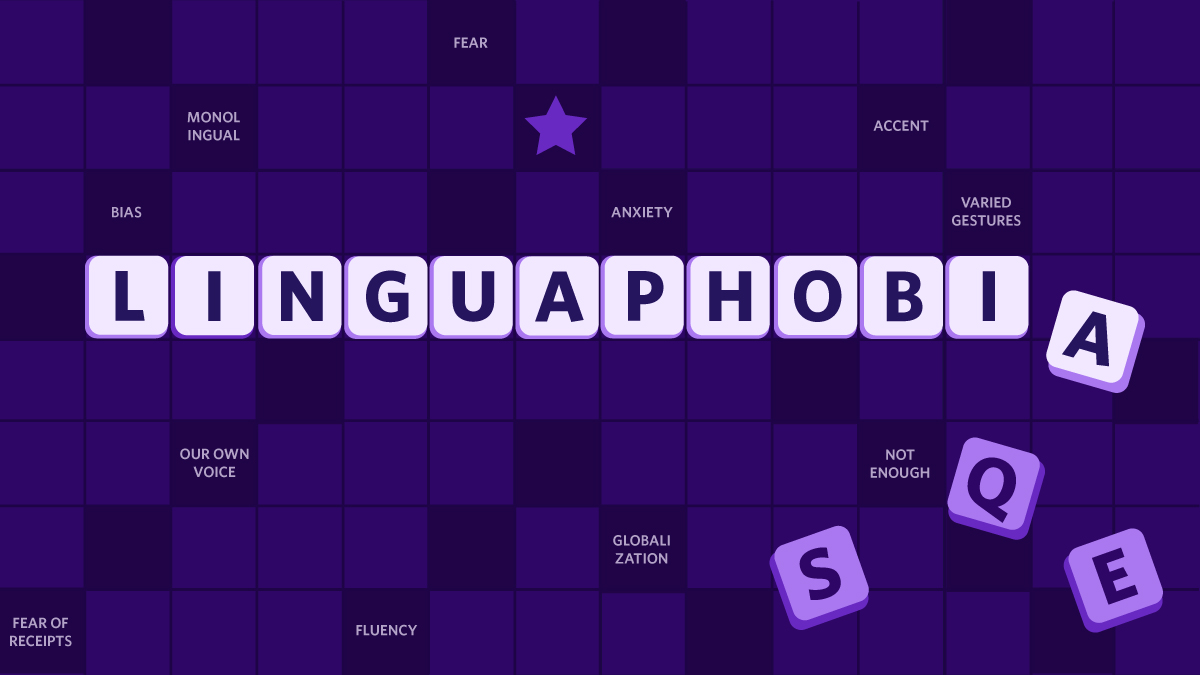

By David Gramling (he/they), professor and head of the Department of Central, Eastern, and Northern European Studies
Knowledge and discovery lives within all languages—including the ones we don’t understand—which is why we can’t afford to fear language.
Society gives us many reasons to fear language: the threat of being misunderstood, misportrayed, or having people use language to gain power over us. All this can lead to a pervasive linguaphobia (fear of language) towards various languages, including our own.
Globalization and what went wrong
In the last few decades, “globalization” rushed in and told us we needed to be ready for global partnerships, exchange, travel, commerce, scale and scope. No longer would knowing only about our own communities and countries be enough for a contemporary life. It was a tall order—scary, sudden, and chaotic—and most of these imperatives to become “global thinkers and actors” were normalized from the 1980s to 2000s. Who could honestly feel ready for all this?
An unfortunate result was that many industries and institutions decided that language learning had to be let go to make “globalization” work; there were too many complicated languages that were too time-intensive to learn. In effect, a generation of industry leaders seems to have embraced monolingual globalization. Rather than figuring out how to do global things in many languages, many have reverted to English to expand enterprise around the world. This is a bad thing. It reduces the volume and flow of meanings that are able to become part of planetary discussions—about COVID-19, climate emergency, Truth and Reconciliation efforts, and the shaping of the political future in our neighborhoods and countries. Meanwhile, age-old fears of “other” languages spiked during the War on Terror, the Trump Era, Brexit, and the like. This has negative and often violent effects not just on languages and meanings, but on the living, breathing people who use them.
Spot-checking and overcoming linguaphobia
We can take action by identifying how the fears of languages, accents, and voices express themselves in our lives.
Anxiety about our own voice
When you listen to your voice, do you like what you hear? No matter in what language, we’re often made to feel that our voice isn’t right, our accent doesn’t sound like it should, we use certain words too frequently, our pitch is too high or monotone.
Instead, how about reframing this to: My voice is uniquely my own, let’s fine-tune a few things so we feel even better about it.
Anxiety about ‘giving ourselves away’
The fear of ‘sounding like where you’re from” prevents some people from talking and expressing themselves. These anxieties can sound like: what if people can tell where I’m from? What if I don’t use fancy enough vocabulary? What if I tell stories differently than my peers?
It is good to be proud of where you’re from, and to share the linguistic features of that with others. There’s no need to remake yourself in a new image because you came to university. Having a specific history or complex experience from another place will always be a benefit, and never a deficiency.
Fear of using languages we’re currently learning
We’re “currently learning” all the languages we use, of course—including our first language—but sometimes there’s this idea that we have to wait until we’re really good at a new language before using it out loud. How would that principle work out, though, in cricket, or hockey, or cooking? You can’t wait years to try it out for real, to get in the real world, and see how it feels, right? Start using the languages you’re learning—early, often, and without unreasonable worry.
Fear of not having enough language
Globalization can give us the impression that we don’t have enough languages; that we need five languages in order to be a real global citizen. That’s not the case. Every language—whether Kreyòl, African American English, hən̓q̓əmin̓əm̓, Dominican Spanish, Langue des signes du Québec, or Yiddish—has more than enough world-making power all on its own. Languages shouldn’t be constrained or countable—much in the way it’s not realistic to count oceans, which are connected to each other in amazing ways. The point isn’t to collect more languages, so much as to use the ones we know in more vivid ways.
Fear of ‘receipts’
Now that we text and email so much, there’s sometimes the idea that it’s better to not say anything, to withhold our language and expression, just in case someone saves what we write or records us without consent. This has a generally suppressive effect on language and expression, and it encourages us to be silent or overly cautious when we should be courageous and involved. It’s your world—don’t keep quiet out of mere habitual fear.
Fear of other kinds of embodied expression
Stage performers and karaoke singers share the vulnerability and strength that comes when others are watching, empowering them with courage rather than being diminished. Find new ways to think positively about your body, your gestures, your style, your gait; how comfortable could you become in the world with all of these embodied ways of expressing yourself to others?
It’s time we undo these forms of linguaphobia, in part by studying and appreciating languages in their everyday, practical use. Being aware of linguaphobia and being open to language learning will help combat various forms of oppression, while also renewing our ability to find pleasure, humanity, and meaning in all languages around us.


David Gramling is a professor and head of the Department of Central, Eastern, and Northern European Studies, where we teach German, Polish, Russian, Swedish, Danish, and—soon—Yiddish! David lives and works on the traditional, ancestral, and unceded territories of the xwməθkwəy̓əm (Musqueam), Stó:lō and Səl̓ílwətaʔ/Selilwitulh (Tsleil- Waututh) Nations.


